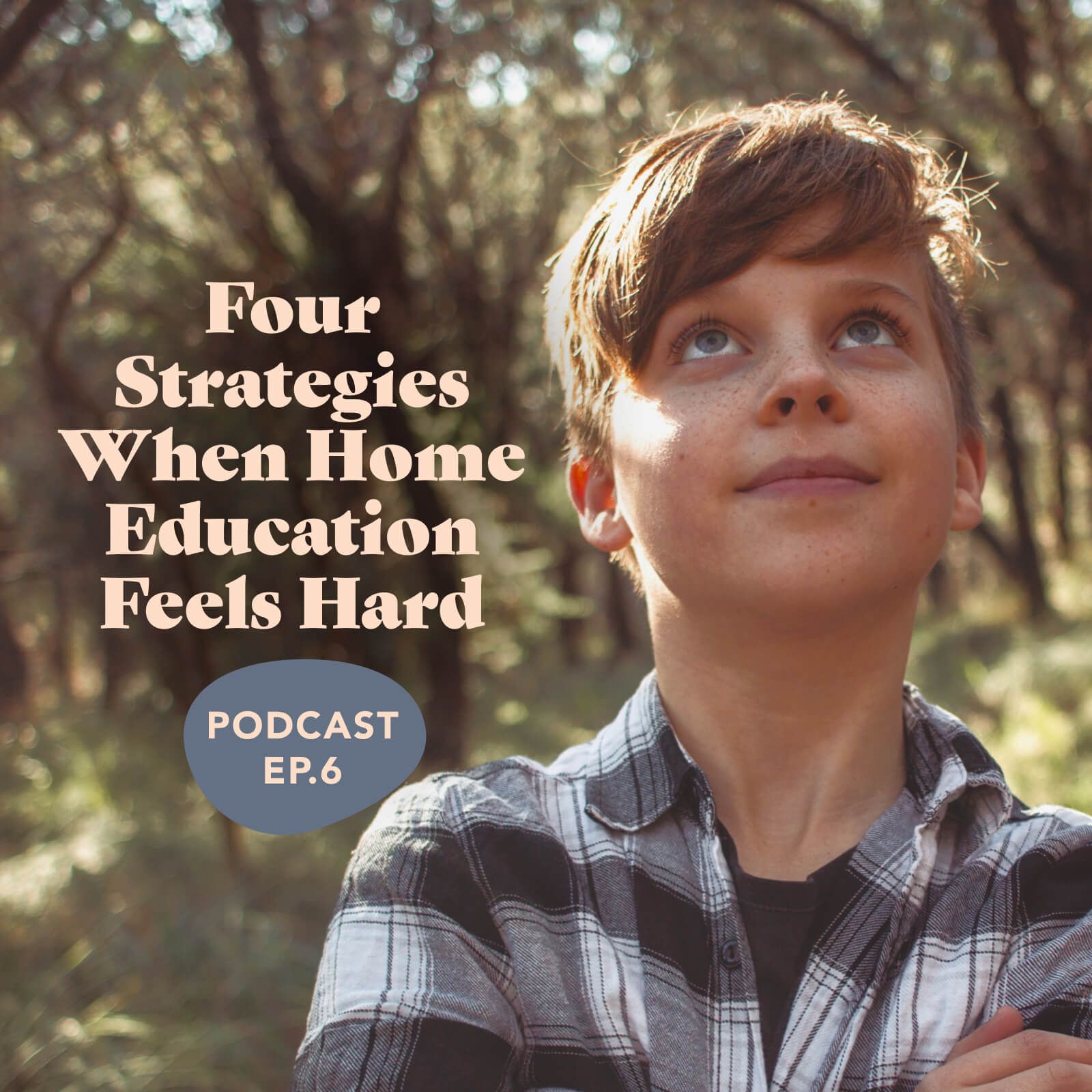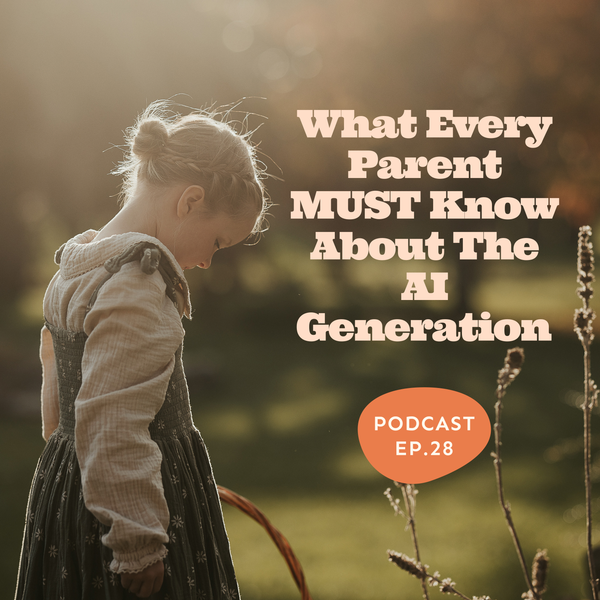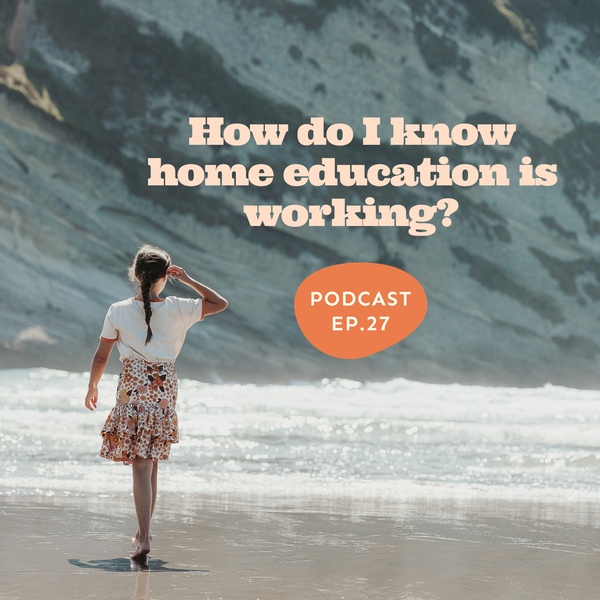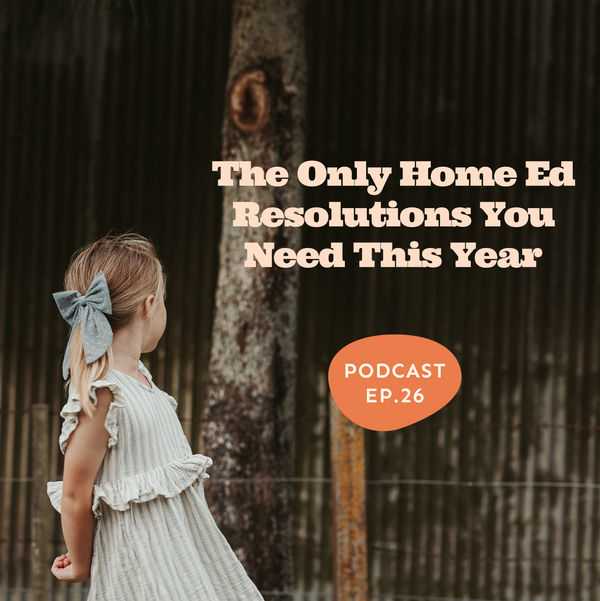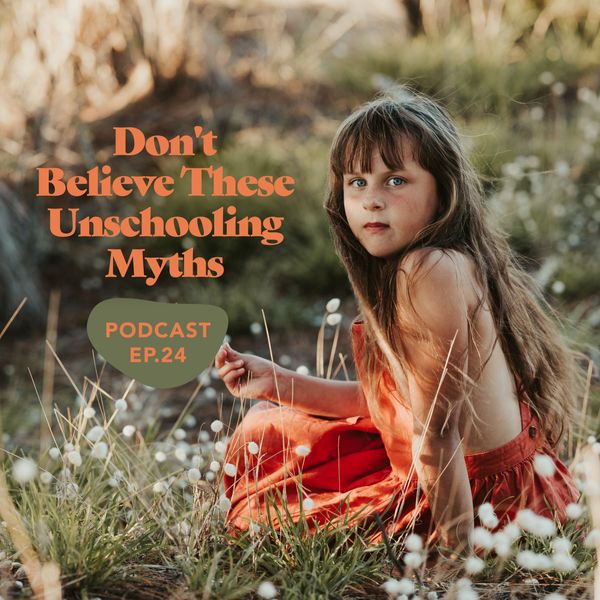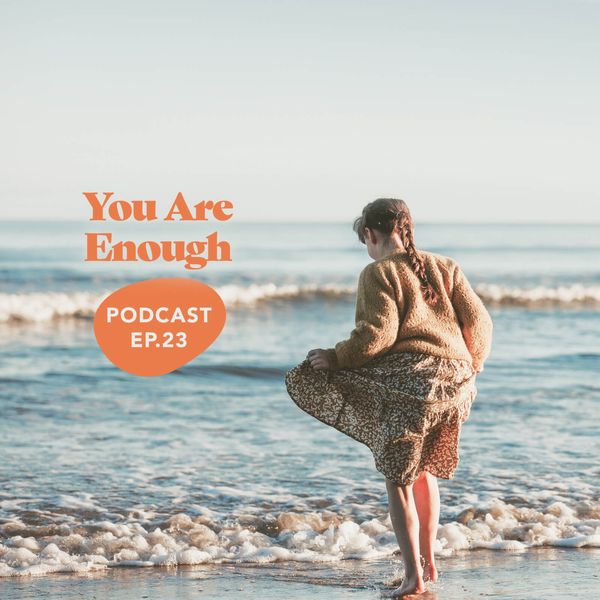This week I want to talk about what to do when this home education path starts feeling hard, because what we’re doing here isn’t easy. As parents, we’re taking on a huge responsibility by choosing to live a life without school, and there’s not always the support we need, or would like. Either practically, or emotionally. There’s no…set playbook for this stuff.
Today, I’m going to talk through four things that have helped me when the journey has felt tough.
Hopefully they bring you some comfort, some reassurance, and the ability to make your way back to those good days when they start feeling hard to find.
These private episodes go even deeper, backed by research, the science of how children learn and grow, and more than a decade of lived home educating experience. Each one is designed to help you rethink, reframe, and recalibrate the way you're walking this path, giving you the confidence to live the version of life you want. The Collection is 23 episodes strong and counting, with over 10 hours of listening available right now.
As a subscriber, you'll also get immediate access to my self-paced course, expert-led masterclasses recordings, five downloadable guides, our school exemption documents, and more 💛
Show Notes
Instagram: https://www.instagram.com/stark.raving.dad/
Facebook: https://www.facebook.com/starkravingdad/
Private Facebook Group: https://www.facebook.com/groups/starkravingdad
Complete Transcript
Helloooo and welcome to the Life Without School podcast, here to help you and your children live the life you want to, not just the one you’re told you should.
I’m Issy, a writer and unschooling dad from New Zealand.
You can find more about me at starkravingdadblog.com, as well as collections of my favourite posts bundled up into encouraging little guidebooks for anyone walking this road less travelled.
Thank you so much for tuning in to listen today. Alright, let’s get into this week’s episode.
MUSIC
Hello again, thanks for tuning back in. I’ve really enjoyed being tagged in your Instagram stories, showing me where you’ve been listening to this podcast. I’ve been with you while you’ve cooked meals as a family, while you’re out in the garden, while you’re commuting, while you’re running or working out…it’s…quite surreal to see these conversations becoming part of your real lives each week. Keep sharing that stuff, please, because it’s just so amazing, and really does feel like my energy cup gets topped up every time I see one.
Ok, this week I want to talk about what to do when this home education path starts feeling hard. Or, when it’s felt hard for some time. Because, what we’re doing here isn’t easy. As parents, we’re taking on a huge responsibility by choosing to live a life without school, and there’s not always the support we need, or would like. Either practically, or emotionally. There’s no…set playbook for this stuff. There’s a lot online that shows us beautiful families doing beautiful things in beautiful homes and spaces (I’m looking at you, Instagram), and while that can be inspiring and lovely, it can also make the hard times feel even harder.
So let’s come together on that, right now, and give each other the permission to say – this lifestyle can be really hard. And that it’s ok that it is.
Today, I’m going to talk through four things that have helped me when the journey has felt tough. None of them on their own will sound particularly ground-breaking or surprising or amazing, but as a combination…as a set of tools to draw on…these four things have been pretty much everything I’ve needed. Hopefully they bring you some comfort, some reassurance, and the ability to make your way back to those good days when they start feeling hard to find.
Ok, let’s go through them:
MUSIC
Strategy number one: get back to basics, and give yourselves – that’s you and your children – some time and space to breathe.
If there are parts of your days and weeks that are working, keep doing them. But if they’re not, don’t. This is…simple to say, of course, but not so easy to do – because it’s fear that gets in our way. Fear of…not being productive enough. Not doing enough. Not progressing enough. Not having enough to show people what we’ve worked on, or what we’ve achieved.
But…the way the world has grown this obsession with productivity is…in my opinion, not good. Don’t get me wrong, being productive can feel wonderful, and result in wonderful things. When you get into the groove, and pull together something you’re proud of, or satisfied with, it’s tangible and amazing. But when we hero that too much, we make the opposite – those times where energy might be lower, or focus might be down – feel…*less*. Like it’s getting in the way of moving forward. I think that’s a problem.
When you think about it, children are very good at being in the moment. Adults, usually, are not.
Not because we don’t want to be, but because we don’t really know how to anymore.
The educational model we’ve built for our children – the one lots of us adults have been through – is based entirely on the concept of a start, a finish, and continual progression against benchmarks in between. Children rarely get the chance to slow down. They can’t simply choose to stop. From a young age we’re continually asked to shift on from moments we’re fully present in because there’s always something else to do. To work towards. To tick off. The next subject, project, worksheet, group activity, lesson, bell, lunch time, assembly, class, test, homework assignment…all week, every week.
And if we’re not careful, we pull a lot of this into our home education approach.
Just remember: races have more losers than winners. That’s just the way they work. And while we’re off chasing abstract things like ‘progress’ and ‘success’, it’s very easy to forget that the rest times, the less complex times, the slow times, the times where it might not feel like we’re moving forward…are actually incredibly important.
My kids and I do karate together, and you often see this concept of yin and yang in martial arts – where what seem to be opposite or contrary forces are actually very connected things. Well, I’m a firm believer that productivity and rest are just like this. One never works very well without the other.
Rest, and times where the pressure comes off, is actually often where and when a period of productivity is born. No one can keep going on and on and on like an Energizer bunny, in any area of life. I know for a fact that most of my really productive times in life have always followed a quieter period, or a time of rest. Of not doing as much. Of giving myself space – and grace – to breathe, and think, and take things slower.
So think about your days. Are there things you spend time on, or try spending time on, that come from the belief you have to continually be productive? Are there layers to your days and weeks that you could remove, or strip back?
Could you…push away that pressure, and give yourself and your children a time of rest instead?
MUSIC
Strategy number two: remember why you’ve chosen this path, because it’s probably quite important.
What is your ‘why’? For us, it began as something that came out of negative experiences our son was going through in a classroom…but over the past few years it’s evolved into a driver that is incredibly positive, and powerful, and meaningful to us.
We home educate because we get to grow up together.
It sounds simple, but…it’s such a …connected…way to live. Obviously, we get to watch our kids grow up, and be part of that…but what we didn’t understand before we started down this path was how much we’d value our children getting to watch us grow up, and be part of that.
So this experience of being together, and growing together, is our why.
When the going gets tough in life – in, any area of life – it’s your why that will give you the ability to dig deep. The motivation to actually *want* to dig deep.
If you’ve listened to the second episode of this podcast – the one where I tell the story of our very squiggly life path up to where we are now – you’ll know that I’ve spent a lot of my working years in the tech startup space. I was responsible for people, and teams of people, fairly early on, so I read everything I could on find on being a good, kind, respectful, motivating leader, because I took that responsibility really seriously. Most of what I read, honestly, wasn’t great, but an author called Simon Sinek caught my attention with an approach to leadership and culture that really resonated with me.
He has a few books out there, but the one that grabbed me first is called Start With Why, and long story short – it’s about making sure you know why you’re doing whatever it is you’re doing long before you ever try and think about the how, or the what. It’s a very simple concept, in theory, and it applies beautifully to almost any area of life. But…it’s so often skipped past.
For businesses, that means starting with being very clear on why you’re selling what you’re trying to sell, because that why, that purpose, will always feel more meaningful and important to you and your customers than the what, or the how. Especially when things get challenging. Those what and how layers always have to come, but they’re much easier to work out and build up, in a much clearer and connecting way, when you start with a foundation of why you’re doing a thing.
So let’s apply this to home education. A lot of headspace goes into what curriculums and resources to use. A lot of headspace goes into what a study area will look like, and how it will be set up. A lot of headspace goes into how a day will be scheduled or what progress will be tracked.
But before any of the many, many what’s and how’s we spend most of our time stressing over, does the same energy go into clearly defining why we’re doing any of this in the first place?
Coming back to my own personal why, as a home educating dad, and I just can’t imagine having a period of time where my children and I aren’t growing alongside each other, learning more about each other, developing ourselves together….*becoming* together. And so whenever the going gets tough, I can strip away all the layers that might be hard because at the end of the day they just don’t matter as much.
Build a foundation of why you’re doing this, and you’ll always have something meaningful to fall back on in those hard times.
MUSIC
Strategy number three:
Remember that you don’t have to be a teacher, and your home does not have to be a classroom.
When things get hard, it can feel like everything is the problem. But often, there’s only one or two major stress points that sit under that big jumble of things. And that one stress point usually triggers a whoollllle bunch of things that layer onto your mental load, confusing it all. In my experience over the past few years – personally, but also based on the messages I’m sent – a lot of those layers grow straight from the very engrained perception most of us have of what education should look like.
That there should be someone teaching, and someone sitting and learning.
So we often start there. And then what follows, for so many families, are days filled with reluctance and push-back from your child that you just can’t get past. If they would just listen, and do what you’re asking, everything would be fine!
But trying to be your child’s teacher, in an environment that feels like a classroom, is the root cause of so much stress in home education. And if you go back to your why – you’ll probably find that some aspect of that is tied to wanting to get away from that style of learning.
When you shake off the teacher expectation you’ve put on yourself, you’ll feel less pressure to perform in a role you probably – deep down – don’t actually even want. But most importantly, your child will feel less pressure to perform as a student in front of one of the people they most love and respect in the world. You can focus on being mum or dad, and your child can relax into being your child again.
I’m often asked how we’ll go about teaching our children when they’re older, when their educational needs start becoming more complex and demanding. People worry a lot about our children not learning enough and progressing in those classic, core academic areas. Because again – that’s what we’ve been conditioned to believe makes up a good education. That’s what we’ve been conditioned to believe we need to succeed in life.
Serious mathematics. Deep historical analysis. Foundational chemistry and physics. These things go way beyond the normal skill set of a parent, how on earth are we going to teach them.
But we’re confusing teaching and learning. They’re not the same thing. I can honestly say I can’t teach my children things like trigonometry and molecular theory. I simply can’t remember enough about any of it from my own schooling days. Neither can my wife, who was also taught those things at school.
But that doesn’t matter, because I’ll say it again – teaching and learning are not the same thing. True learning does not just happen when someone is taught. It does not just happen through the relentless presenting of information. It happens when the learner is ready for it, and has access to it. It happens when they are interested. When they are in the right headspace. It happens when they can slow down if they’re not fully understanding things. When they can connect it to the world around them so it has meaningful context. When they’re free to learn in their own way, in their own space, in their own time.
It is not our ability or willingness to teach our children that ensures learning. It is that we know who they are, and what makes them tick. It is knowing when to push forward on something with them, and when to peg it back. It is knowing how they will best receive information and making sure they know when and how to find it when they need to.
It is that beautiful synergy between a child ready to discover more about the world and a parent in tune with when to open the right doors so they can.
Please understand that it’s not the worksheet you and your child are fighting over that’s the problem. It’s not that you need to find a better worksheet, or that your child needs to find a better attitude towards it, it’s that you need to ask yourself whether you’re trying to make your child learn because that’s what you believe you need to do.
Go back to the very first point I talked about today – getting back to basics, and keeping things simple. Do you need to be putting the academic pressure on right now?
Or is it just that you feel you should?
MUSIC
Strategy number four:
Talk about it.
It’s…amazing what just putting your feelings out there can do when you get a bunch of other people saying ‘ohhh, I’ve been there, or I am there, keep going, this is important’. It’s like…recharging a battery. But to get those sorts of responses, the person you’re speaking to needs to actually understand. Some of us have home educating friends or family, so that makes it easy, but maaaaaaaaaany of us don’t – and that can make it really hard. And it can make the hard times seem that much harder. This is…one of the main reasons I’m doing the work I’m doing. To connect people, all around the world, who have chosen to walk a path that can – at times – feel a bit lonely.
So, if it helps, use what I’m putting out there to connect with others. The comments on my Facebook and Instagram posts are always an amazing place to feel validated, and supported, and comforted, and seen. Never hesitate to ask questions there, or just dump out how you’re feeling. The community there is so uplifting. And my Facebook group – which is private specifically so that it can be a place of vulnerability – has 3,000 home educating parents, and growing, who will understand whatever it is you’re going through or feeling right now. Who have probably been there themselves. Who may even be able to help you steer your way out of it. And who, at the very least, provide a kind, patient and understanding ear.
And then there’s me. I’m here. Reach out in an Instagram or Facebook message, or send me an email. I don’t always have the time to get back to every message, but I’ll keep trying to be a support and a sounding board to anyone who needs it.
I’ll put all these links and contact points – to my posts, to the Facebook group, and to my personal email address – in the show notes. So please…when times get hard, come and talk.
CLOSING MUSIC
If you’re finding this path hard right now, I hope this conversation has helped take some of the heat out of those feelings. I hope it’s lifted some of that pressure from your shoulders, and from your heart. I hope it’s provided some light.
But if nothing else, please just know you’re not alone.
I want to close out this episode by reading one of my favourite posts, because it captures almost everything I’ve talked about here today. It captures how overcomplicated we’ve made education. It captures the stress and pressure so many of us carry.
And, most importantly, it captures a pretty compelling why.
It goes like this:
We’ve become completely obsessed with the idea that children must learn. Subjects, tests, benchmarks, progress, grades, awards, expectations, pressure…these words have become synonymous with childhood, and the age we start using them is getting younger and younger.
Before a child has a chance to start exploring their uniqueness, who they really are and how they’d like to express that in the world, they’re asked to gather in a group and spend 13 years walking along the same path as everyone else.
They’re told what they’ll be learning, when they’ll be learning, and where they’ll be learning it. They’re told what is expected of them, by what age, and how and when they’ll need to prove they’re meeting the standards. Whether or not the method of proof comes naturally to them, or that they find the topics interesting, is irrelevant. It is too bad if the physical space is one they don’t thrive in.
Throughout this learning journey the child will move progressively toward proficiency in what has been asked of them. And they will move progressively away from a desire to explore what makes them unique.
In the end, they will become pretty much who they’ve been asked to become. For many, the spark of individuality that was ready to ignite in childhood will be all but extinguished.
We’ve created a strictly linear system from which it is almost impossible to explore other paths, and this will remain a fact for as long as we focus childhood on achieving a single gold standard.
It is time to consider a very different starting premise for education approaches globally:
That the true essence of childhood is not learning. It is becoming.
Thank you, as always, for listening today. And if you’re in a position to support this podcast, and the work I’m doing in the home education community, please consider checking that out on my website.
Ok, I’ll see you back here soon.
Bye for now.


